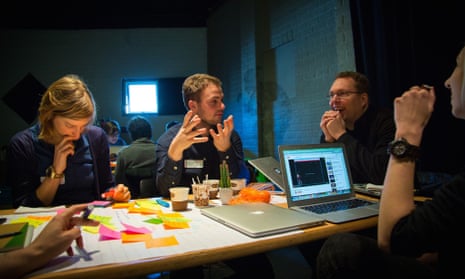This week, the Guardian is co-organising a news game jam at the Rezzed PC gaming festival in London. Small teams of coders and designers will be given a selection of recent stories from the newspaper, and will then have 48 hours to create games based around the article they choose. The best entries will be made available via the Guardian site.
The idea of a “news game” is not, in fact, new. Since the mid-nineties, when web plug-ins like Flash made it possible to produce quick, cheap games then distribute them online, developers have been creating interactive news experiments. Italian studio Molleindustria was a pioneer, launching the fast food satire McDonald’s Game and oil business expose Oiligarchy, while US developer Persuasive Games has tackled subjects like mass food production (Bacteria Salad) and airport customs (Airport Insecurity).
Charities, museums and galleries have all explored the potential of games as a potent medium for engagement and instruction. The Wellcome Trust has been working with game developers for years, developing titles to explore bioscience issues, while Cancer Research is the latest organisation to use gamers as a resource via its title Reverse the Odds, which tasks players with analysing real-life cancer cells.
In the mainstream press, however, we’re yet to see the concept of “interactive journalism” develop beyond the provision of quizzes and polls, explorable data apps, and big multimedia experiments like the Guardian’s own Firestorm. Games as a news delivery mechanism hardly figure.
Partly of course, there are huge ethical concerns. Although the medium has matured greatly over the past five years, there is still a cognitive backlash against the idea of “playing” with real-life stories in which people may have been killed or injured. Speaking about this issue in a Guardian feature two years ago, Persuasive Games co-founder Ian Bogost said, “Without a set of examples that move players to be affected by non-fiction games, and without more widely published and read criticism about why such games are useful, its no wonder [newspaper readers] find themselves unsure and afraid. That may change over time, but we need more games to make it happen.”
But so far there haven’t been many more games, and that’s maybe as much to do with cost and development resources as it is to do with ethics. Even low-budget games, built using cheap tools like Unity3D or Game Maker can take a long time to plan, implement and develop – if they are treated as high-end, high-polish interactive projects. Slowly that is happening: Al Jazeera has its AJ+ mobile app which treats story media as a selection of cards which can be “stacked” by the user into their own custom-built stories; and last November, the Dutch newspaper Volkskrant released its own simulation game Refugee Republic, exploring the realities of life in a refugee camp.
“We’re really starting to see momentum in this area now, and it’s very exciting,” says Tomas Rawlings, whose Bristol studio Auroch Digital has produced news games like NarcoGuerra and Endgame: Syria. “I was pleased to the see The Guardian publishing a newsgame on immigration, plus BuzzFeed says they are going to be investing $50m into casual games – I hope we’ll see some of that going into news games. The new rise in VR technology has also [led to] projects that try to bring a far-way conflict to life in front of you.”
These are major endeavours though. Instead, inspiration for the future growth of the news game concept may well come from the game jam or hackday scene, where small teams compete to build playable prototypes over a weekend. They’re rough, they’re buggy, but they often provide the basis for interesting interactive experiences that can be iterated on later. Which is why we’re running the experiment at Rezzed.
There’s already a burgeoning news game hack scene. Last year in Cologne, development studio The Good Evil ran Europe’s first news game hackathon, where representatives from several major media companies, including the Guardian and Germany’s Deutsche Welle and The Suddeutsche Zeitung, took part making small games based around topical issues.
In February, Dutch workshop and hackspace organiser Hackastory ran a similar event in Amsterdam, again drawing in major European media companies to produce quick news game concepts. The results included Be The President Today, which gives players in control of Azerbaijan and News Bricks which, like AJ+, reduces stories into separate searchable components which can be structured and unlocked by readers.
“The internet, social media, mobile and wearable technology are changing the way we tell stories,” says Hackastory co-founder Albertine Piels. “Digital storytelling doesn’t have a tradition yet compared to film making and newspapers, so we need to work together with different skills: developers, gamers and designers. We also believe in learning by making. We shouldn’t talk as much about it, but just start doing it. In our accelerating world, we need to experiment more.”
According to Hackastory’s Nienke Huitenga, it’s likely interactive journalism will evolve to consist of two streams: fast, reactive games, and longer form experiences. “We like big, feature film-like stories like Serial, because we recognise them from other media like film, tv and radio,” she says. “Therefore we understand how to ‘love it’”. Hackastory is already working on its next jam, with the Interactive Factual Lab in Leuven, Belgium, which runs from 2-3 May.
The news game experiment at Rezzed could be the first time the concept has ever been explored at a major gaming festival. It will be fascinating to see how young game developers, rather than major media corporations, approach the problem of presenting current affairs as an interactive experience. But, as Albertine Piels argued, there’s only one way to find out, and that’s to do it.

Comments (…)
Sign in or create your Guardian account to join the discussion